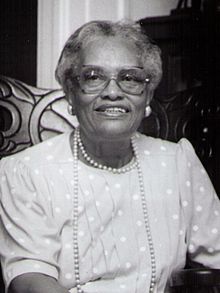Keys v. Carolina Coach Co.
Sarah Keys v. Carolina Coach Company, 64 MCC 769 (1955) is a landmark civil rights case in the United States in which the Interstate Commerce Commission, in response to a bus segregation complaint filed in 1953 by a Women's Army Corps (WAC) private named Sarah Louise Keys, broke with its historic adherence to the Plessy v. Ferguson separate but equal doctrine and interpreted the non-discrimination language of the Interstate Commerce Act of 1887 as banning the segregation of black passengers in buses traveling across state lines.
[9] The ruling made legal history both at the time of its issuance and again in 1961, when Attorney General Robert F. Kennedy invoked it in his successful battle to end Jim Crow travel during the Freedom Riders' campaign.
[18] Unwilling to accept the verdict of the North Carolina lower court sustaining the charge, Keys and her father brought the matter to the attention of the National Association for the Advancement of Colored People (NAACP) office in Washington, D.C., headed by Howard University Law School professor Frank D. Reeves.
[3] Though Robertson and Roundtree were but a year at the bar in the fall of 1952 when they undertook to represent Sarah Keys, they had been trained at Howard University Law School by such renowned civil rights lawyers as Thurgood Marshall, James Nabrit Jr., and George E.C.
[22][23] On September 1, 1953, two months before Thurgood Marshall and his legal team made the second round of oral arguments in Brown before the Supreme Court asserting that the Fourteenth Amendment's "equal protection" clause prohibited segregation, Sarah Keys became the first black petitioner to bring a complaint before the Commission on a Jim Crow bus matter.
[25][26] Roundtree, through a Spelman classmate who lived in Sarah Keys' Congressional district, contacted Congressman Adam Clayton Powell to protest Freidson's ruling and demand a re-hearing by the full 11-man Commission.
"[18] Hailed by the press as a "symbol of a movement that cannot be held back,"[29] the Keys case marked a turning point in the legal battle against segregation, and a major departure from the ICC's history in racial matters.
Impelled by the protests of civil rights leaders and the weight of international outrage at the brutality perpetrated on the Freedom Riders[30] Kennedy took the unusual legal step of issuing a petition to the Interstate Commerce Commission on May 29, 1961, in which he called upon them to implement their own rulings.
Parks' action assumed an importance far beyond the level of a municipal incident, giving rise to a Supreme Court decision banning segregation in travel within the individual states (Browder v. Gayle, 352 U.S. 903 (1956)) and igniting the civil rights campaign which thrust the Rev.


